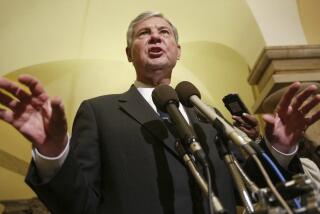Tom Braden dies at 92; former CIA operative became columnist and talk show co-host
Tom Braden, a former CIA operative who became a syndicated newspaper columnist, liberal co-host of the CNN talk show “Crossfire” and author of “Eight Is Enough,” a 1975 memoir that spawned the popular television series, died of natural causes Friday at his Denver home, his family said. He was 92.
Braden was the father of eight children whose misadventures provided amusing grist for many of his newspaper columns and led to the ABC comedy-drama “Eight Is Enough,” which aired from 1977 to 1981 and starred Dick Van Patten as Tom Bradford, a Sacramento columnist with a brood of children ages 8 to 23.
But Braden was also prominent as one of the original co-hosts of “Crossfire,” the topical show that made its debut in 1982 and pitted him against former Nixon aide and political commentator Pat Buchanan.
His varied careers also included a Cold War-era stint with the CIA’s International Organizations Division, which secretly funded anti-communist front groups and promoted American culture in Europe by sponsoring visits of American symphonies and publishing Encounter magazine. He defended the covert operations in a controversial 1967 article in the Saturday Evening Post titled “Why I’m Glad the CIA Is Immoral.”
Braden was born in Greene, Iowa, on Feb. 22, 1917. His father worked a variety of jobs, including at a tie store and a bank. His mother was a writer for American Mercury, the magazine founded by H.L. Mencken and drama critic George Jean Nathan.
Braden dropped out of high school during the Depression and worked briefly for a printing press in New York. He wanted to go to college and applied to Dartmouth, which was one of the few schools that accepted students without a high school degree. He was interested in journalism and became editor of the campus newspaper. He graduated in 1940.
In 1941, he went to England and was among a small group of Americans who enlisted in the King’s Royal Rifle Corps in the British Army to fight in World War II. He later joined the U.S. Army and shifted to intelligence work for the Office of Strategic Services, the predecessor of the CIA.
With Stewart Alsop, the columnist and political analyst who had also fought with the British Army and joined the OSS, Braden wrote the book “Sub Rosa: The OSS and American Espionage” (1946).
After the war, he taught for a few years at Dartmouth, where he met poet Robert Frost, who encouraged him to pursue journalism. But in 1950 he joined the CIA and worked for Allen Dulles, who became CIA director in 1953. One of Braden’s duties was to funnel hundreds of thousands of dollars to anti-communist elements in labor unions such as the AFL-CIO.
He also helped the agency wage a propaganda war by sponsoring cultural events, including a European tour of the Boston Symphony Orchestra, and placing agents in various organizations, including Encounter magazine. Braden himself was a covert cultural agent who worked as executive secretary at the Museum of Modern Art in New York.
After leaving the CIA in 1954, he moved with his family to California, where he became involved in politics. During most of the 1960s, he was president of the state Board of Education, where he often feuded with Max Rafferty, the conservative superintendent of public instruction. In 1966, he ran unsuccessfully for lieutenant governor against Democratic incumbent Glenn M. Anderson.
For 13 years, he also published an Oceanside newspaper, the now-defunct Blade-Tribune, which he had purchased in 1954 with a $100,000 loan from Nelson Rockefeller, the industrialist who became New York governor. He repaid Rockefeller when he sold the paper for more than $1 million in 1968.
After selling the newspaper, he moved with his wife, Joan, and their large family to Washington, D.C., where he became a columnist.
He started to tangle with Buchanan after a writing a column critical of the Nixon special assistant in 1973. Buchanan fired back with an angry letter.
Four years later, Braden was tapped to replace Frank Mankiewicz, a former Robert Kennedy campaign aide, on a nationally syndicated radio program called “Confrontation” on which Buchanan provided the opposing viewpoint. In 1982, they took their bruising debates to CNN, launching “Crossfire.” Braden argued from the left for seven years, until he was replaced by Michael Kinsley in 1989.
As a columnist, Braden often struggled to find material. “When he was desperate for a column, he wrote about us,” his daughter Susan Braden said in an interview Friday.
He turned the pieces about his children into a book after a Washington colleague, columnist Joseph Alsop, told him that his best writing involved his family’s ups and downs.
The book didn’t sell well at first, despite the many entertaining tales Braden told, such as when one son was arrested on marijuana charges and when a daughter’s pet boa constrictor went missing. He also told of the time the family’s lamb nuzzled up against a famous dinner guest, Supreme Court Justice William O. Douglas.
Braden’s wife died in 1999. His son Tommy, the seventh of his eight children, died in 1994. His surviving children are David Braden of Taipei, Taiwan; Mary Poole of Alexandria, Va.; Susan Braden of Takoma Park, Md.; Joannie Braden, Nancy Basta and Elizabeth Braden, all of Denver; and Nicholas Braden of Washington, D.C. He also leaves 12 grandchildren.
More to Read
Start your day right
Sign up for Essential California for the L.A. Times biggest news, features and recommendations in your inbox six days a week.
You may occasionally receive promotional content from the Los Angeles Times.







